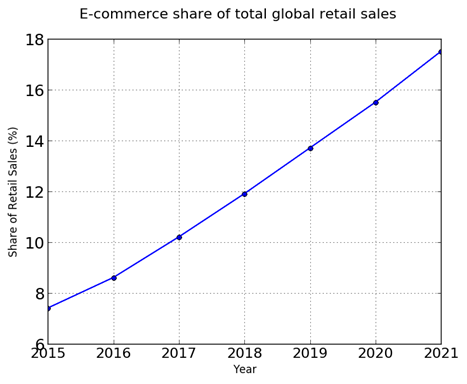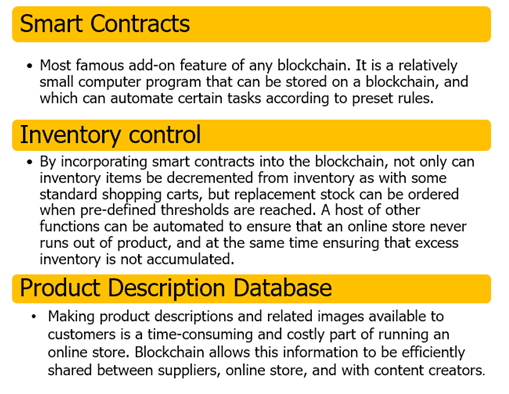
Blockchain technology is steadily gaining impetus and is deemed to have great importance in the global economy. Of all the available industries, where blockchain technology has been proposed to transform the way things are traditionally done, obviously there are many – e-Commerce is certainly the leader of the pack. E-commerce is amongst the industries that are steadily increasing the use of blockchain technology inorder to facilitate safer and faster financial transactions.
Of late, the commonbuzzwords used in the industry are “E-Commerce”,“Blockchain” and “Bitcoin”. Besides, we have seen e-Commerce giants ranging from Walmart to Unilever shifting towards Blockchain. First things first, so what exactly is e-Commerce, and further delve into Blockchain and is it going to redefine e-Commerce industry?
Current Scenario of e-Commerce
Is the e-Commerce market expanding? Based on the data from IPC BE (e-commerce forum) the market trends and growth has been visualised in Figures 1-2. From Figure 1 it is evident that the projections are upward and seems to be undisputable with no signs of decline. The online sales improved from $2.3 to $2.8 trillion, almost comprising a 10% of current total global retail sales and increasing the online share close to 15% in 2019 which can be seen in Figure 2. The estimated growth rate is about 265% [Based on Data from 2014 ($1.3 trillion) vs 2021($4.9 trillion) projections]. In this regard to exploit this e-Commerce trend, physical stores must focus on e-Commerce infrastructure to bring their businesses from offline to online. For instance, when improvements are made in e-Commerce infrastructure, internet penetration and payment systems, this market is bound to expand even further.

Figure 1‑ Global Trend – e-Commerce Growth

Figure 2E-commerce Global Retail Sales
So how it actually works? The success is partly attributed to various e-Commerce platforms that are able to develop an e-Commerce solution that attracts small and medium enterprises which ideally don’t have time and resources to create their own e-Commerce platform. As result it involves operation costs, fees and commissions charges which leaves little room for small/mid level firms to make money out of e-Commerce. For instance it includes credit card/ payment processer fees also,Paypal typically charges about 3%. These factors need to be weighed in, then included in the price before passing on to the consumer. Morever there are various barriers limiting the e-Commerce growth such as complex and costly infrastructure, access issues and lack of trust in security and privacy. Because of this scenario, many small businesses end up in a place where they can’t compete. In this regard, we pose a question “Is it possible for Blockchain technology to solve the issues related to costs and infrastructure of e-Commerce?”
To address this question, we need to understand the fundamentals of Blockchain. Let’s have a look!
Blockchain and its purpose
A chain of online transactions usually performed in crypto currencies and conserved as shared legder across numerous computers on a peer-to-peer network is regarded as Blockchain. In a nutshell, it is a technology that allows information to be digitally transferred between people without any intermediaries like banks, insurance firms etc. They have significant applications in the areas like supply chain management, money transfer, online retail, data sharing and storage, digital identification systems and tax regulation, and so on. For example, blockchain allows companies to directly work with consumers to exchange money and services, thereby reducing the operating costs associated with servers, storage and security. It can handle user activities like product searches, processing payments and customer care. Some of the commonly used blockchain technologies are Ethereum and Bitcoin. Ethereum offers a technical platform for e-commerce websites where their blockchains can be managed. Bitcoin is basically a cryptocurrency that led to the creation of Blockchain technology.
Having gained an insight on Blockchain technicalities, let us explore how it is different compared to traditional e-Commerce. This comparison hopefully answers the question “Will Blockchain overtake traditional e-Commerce?”. The differences observed in payment methods are tabulated below, further Figure 3 illustrates the advantages in adopting Blockchain.
| Criterion | Traditional e-Commerce | Blockchain |
| Payment Process | Slow | Payments through cryptocurrencies, faster and safe operates on push transactions principle |
| Processing fees | High | Nominal rates, even exchange rates (crypto to USD, EUR, GBP) will be low |
| Customer Satisfaction | Disagreements resolution systems will leave negative impact on future customers | Cryptopayments strives to gain customer trust and build strong affinity |

Figure 3. Traditional e-commerce approach vs Blockchain comparison
( Source: https://www.openxcell.com/blockchain-set-to-redefine-ecommerce)
Blockchain’s influence on e-Commerce
The advent of Blockchain technologies has transformed the e-Commerce ecosystem. Now, e-Commerce players are shifting towards an economic ecosystem that is smoother, faster and easier for consumers and online retailers. In a way, Blockchains strive towards enhancing the customer experience. Some of the solutions using Blockchain are as follows:
- Enable cryptocurrency payments: Leads to larger consumer pool with low costs for exchanging money and services. Offers international transactions at lower exchange rate by which we can eliminate fraudulent purchases and charge-backs.
- Infrastructure:Blockchain is in decentralized nature, which will lower the need for data storage thereby cutting costs related with data handling and security. It has the ability to store information across the network. No need to worry on customer privacy and data security, blockchains anonymity and functionality to the rescue! As a result, low costs will enable the small businesses to break the barrier and enter into the market.
- Improved User Experience: Blockchain will eliminate multiple getaway logins while purchasing, in the meanwhile providing better security (DLT – Distributed Ledger Technology). Cheap, faster and more secure payments and a more transparent market place. Better visibility leads to increase in adoption ?!
Besides, there are wide range of applications for Blockchain in e-Commerce, which includes Fund Transfers, Web payment transactions, Decentralized digital market and effective Retail Management. Some of the applications of Blockchain in e-Commerce can be seen in Figure 4.

Conclusion
In future, Blockchains will act as the backbone for online sales and payments. Aims to democratize the economy by making the e-Commerce ecosystem more transparent, thereby allowing users to have control over their transactions. By adopting Blockchain, e-Commerce will become cheaper, faster, secure and more accessible. Cryptocurrency payment methods will benefit sellers in reducing costs, and opens a new horizon widening the scope of e-Commerce!






